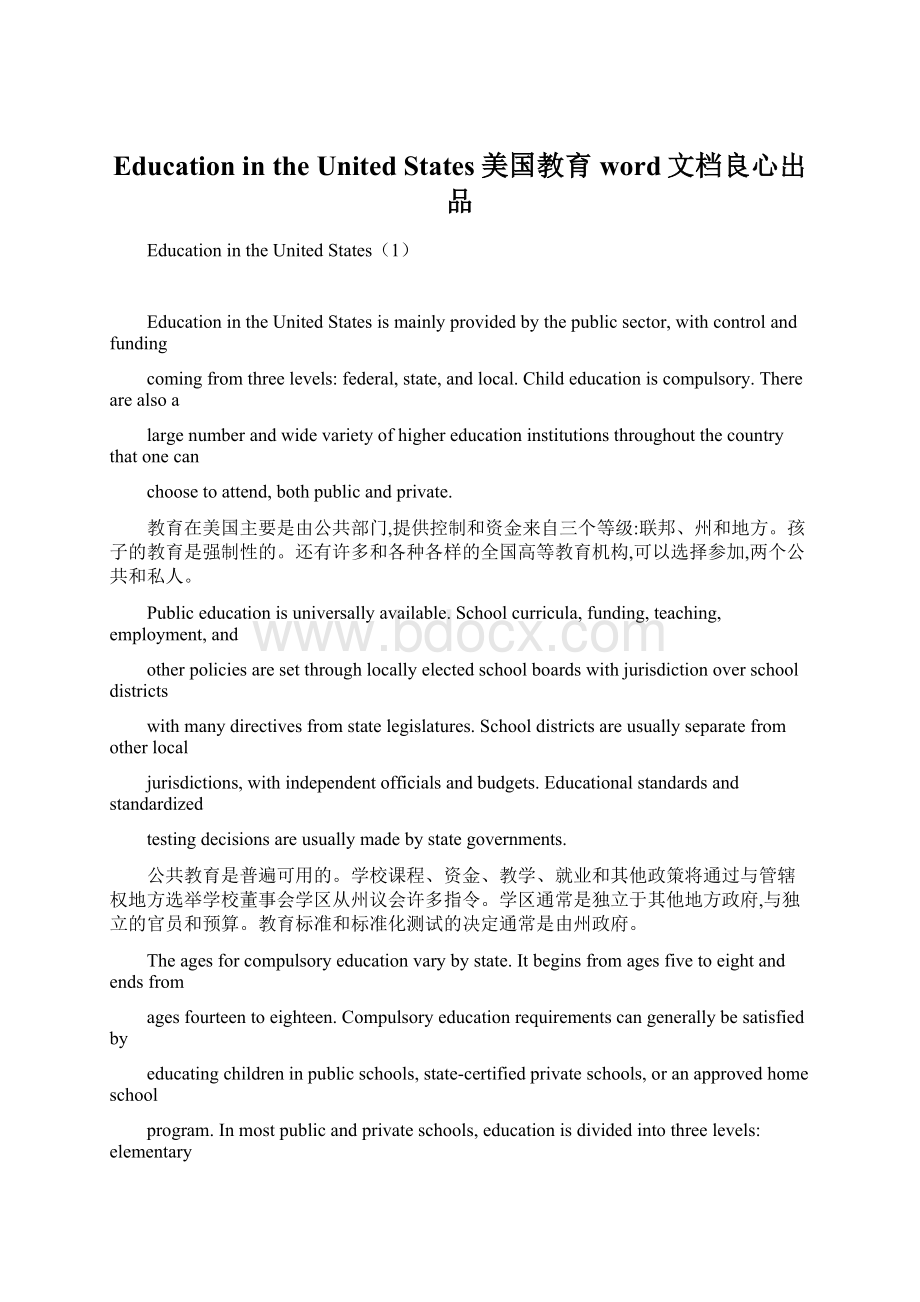Education in the United States美国教育word文档良心出品.docx
《Education in the United States美国教育word文档良心出品.docx》由会员分享,可在线阅读,更多相关《Education in the United States美国教育word文档良心出品.docx(54页珍藏版)》请在冰豆网上搜索。

EducationintheUnitedStates美国教育word文档良心出品
EducationintheUnitedStates
(1)
EducationintheUnitedStatesismainlyprovidedbythepublicsector,withcontrolandfunding
comingfromthreelevels:
federal,state,andlocal.Childeducationiscompulsory.Therearealsoa
largenumberandwidevarietyofhighereducationinstitutionsthroughoutthecountrythatonecan
choosetoattend,bothpublicandprivate.
教育在美国主要是由公共部门,提供控制和资金来自三个等级:
联邦、州和地方。
孩子的教育是强制性的。
还有许多和各种各样的全国高等教育机构,可以选择参加,两个公共和私人。
Publiceducationisuniversallyavailable.Schoolcurricula,funding,teaching,employment,and
otherpoliciesaresetthroughlocallyelectedschoolboardswithjurisdictionoverschooldistricts
withmanydirectivesfromstatelegislatures.Schooldistrictsareusuallyseparatefromotherlocal
jurisdictions,withindependentofficialsandbudgets.Educationalstandardsandstandardized
testingdecisionsareusuallymadebystategovernments.
公共教育是普遍可用的。
学校课程、资金、教学、就业和其他政策将通过与管辖权地方选举学校董事会学区从州议会许多指令。
学区通常是独立于其他地方政府,与独立的官员和预算。
教育标准和标准化测试的决定通常是由州政府。
Theagesforcompulsoryeducationvarybystate.Itbeginsfromagesfivetoeightandendsfrom
agesfourteentoeighteen.Compulsoryeducationrequirementscangenerallybesatisfiedby
educatingchildreninpublicschools,state-certifiedprivateschools,oranapprovedhomeschool
program.Inmostpublicandprivateschools,educationisdividedintothreelevels:
elementary
school,middleschool(sometimescalledjuniorhighschool),andhighschool(sometimesreferred
toassecondaryeducation).
义务教育的年龄变化的状态。
从5至8岁开始和结束从十四岁到十八岁。
义务教育的需求通常可以满足教育孩子在公立学校,国家认证的私立学校,或者批准的家庭学校的计划。
在大多数公立和私立学校,教育分为三个层次:
小学、中学(有时称为初中),和高中(有时称为中等教育)。
Inalmostallschoolsattheselevels,childrenaredividedbyagegroupsintogrades,rangingfrom
kindergarten(followedbyfirstgrade)fortheyoungestchildreninelementaryschool,upto
twelfthgrade,thefinalyearofhighschool.Theexactagerangeofstudentsinthesegradelevels
variesslightlyfromareatoarea.
在几乎所有的学校在这些层面,孩子们按年龄段划分为等级,从幼儿园(其次是一年级)最小的孩子在小学里,到第12年级,高中的最后一年。
这些学生年级的确切年龄范围地区略有不同。
Post-secondaryeducation,betterknownascollegeintheUnitedStates,isgenerallygoverned
separatelyfromtheelementaryandhighschoolsystem,andisdescribedinaseparatesection
below.
高等教育,更好的被称为“大学”在美国,通常是分开治理中小学系统,和下面的描述在一个单独的部分。
Statistics统计数据
Intheyear2000,therewere76.6millionstudentsenrolledinschoolsfromkindergartenthrough
graduateschools.Ofthese,72percentaged12to17werejudgedacademicallyontrackfortheir
age(enrolledinschoolatorabovegradelevel).Ofthoseenrolledincompulsoryeducation,5.2
million(10.4percent)wereattendingprivateschools.
有,岁的这些人中17岁至12万名学生参加了学校从幼儿园到研究生院。
7660有,年2000在.
72%在学术上被判定“正轨”,他们的年龄(参加学校以上级别)。
参加义务教育,520万(10.4%)参加私立学校。
Amongthecountry'sadultpopulation,over85percenthavecompletedhighschooland27percent
havereceivedabachelor'sdegreeorhigher.Theaveragesalaryforcollegeoruniversitygraduates
isgreaterthan$51,000,exceedingthenationalaverageofthosewithoutahighschooldiplomaby
morethan$23,000,accordingtoa2005studybytheU.S.CensusBureau.The2010
unemploymentrateforhighschoolgraduateswas10.8%;therateforcollegegraduateswas4.9%.
国家的成年人口中,超过85%已完成高中和27%收到学士学位或更高。
学院或大学毕业生的平均工资大于51000美元,超过了全国平均水平没有高中文凭的超过23000美元,据美国人口普查局2005年的一项研究。
2010年的高中毕业生的失业率为10.8%;大学毕业生的比例是4.9%。
Thecountryhasareadingliteracyrateat99%ofthepopulationoverage15,whilerankingbelow
averageinscienceandmathematicsunderstandingcomparedtootherdevelopedcountries.In
2008,therewasa77%graduationratefromhighschool,belowthatofmostdevelopedcountries.
ThepoorperformancehaspushedpublicandprivateeffortssuchastheNoChildLeftBehindAct.
Inaddition,theratioofcollege-educatedadultsenteringtheworkforcetogeneralpopulation(33%)
isslightlybelowthemeanofotherdevelopedcountries(35%)andrateofparticipationofthe
laborforceincontinuingeducationishigh.A2000sstudybyJonMillerofMichiganState
UniversityconcludedthatAslightlyhigherproportionofAmericanadultsqualifyas
scientificallyliteratethanEuropeanorJapaneseadults.
Schoolgrades学校的成绩
Mostchildrenenterthepubliceducationsystemaroundagesfiveorsix.TheAmericanschool
yeartraditionallybeginsattheendofAugustorthedayafterLaborDayinSeptember,afterthe
traditionalsummerrecess.Childrenareassignedintoyeargroupsknownasgrades,beginning
withpreschool,followedbykindergartenandculminatingintwelfthgrade.Childrencustomarily
advancetogetherfromonegradetothenextasasinglecohortorclassuponreachingtheendof
eachschoolyearinlateMayorearlyJune.
TheAmericaneducationalsystemcomprises12gradesofstudyover12calendaryearsofprimary
andsecondaryeducationbeforegraduatingandbecomingeligibleforcollegeadmission.After
pre-kindergartenandkindergarten,therearefiveyearsinprimaryschool(normallyknownas
elementaryschool).Aftercompletingfivegrades,thestudentwillenterjuniorhighormiddle
schoolandthenhighschooltogetthehighschooldiploma.
TheU.S.usesordinalnumbers(e.g.,firstgrade)foridentifyinggrades.Typicalagesandgrade
groupingsinpublicandprivateschoolsmaybefoundthroughtheU.S.DepartmentofEducation.
Manydifferentvariationsexistacrossthecountry.
Studentscompletinghighschoolmaychoosetoattendacollegeoruniversity.Undergraduate
degreesmaybeeitherassociate'sdegreesorbachelor'sdegrees(baccalaureate)
Communitycollegetypicallyoffertwo-yearassociate'sdegrees,althoughsomecommunity
collegesofferalimitednumberofbachelor'sdegrees.Somecommunitycollegestudentschooseto
transfertoafour-yearinstitutiontopursueabachelor'sdegree.Communitycollegesaregenerally
publiclyfundedandoffercareercertificationsandpart-timeprograms.
Four-yearinstitutionsmaybepublicorprivatecollegesoruniversities.
Mostpublicinstitutionsarestateuniversities,whicharesponsoredbystategovernmentsand
typicallyreceivefundingthroughsomecombinationoftaxpayerfunds,tuition,privatedonations,
federalgrants,andproceedsfromendowments.Stateuniversitiesareorganizedinawidevariety
ofways,andmanyarepartofastateuniversitysystem.However,notallpublicinstitutionsare
stateuniversities.Thefiveserviceacademies,oneforeachbranchofthearmedforces,are
completelyfundedbythefederalgovernment;theacademiestrainstudents(cadetsormidshipmen)
tobecommissionedofficersinexchangeforamandatorytermofmilitaryservice.Additionally,
somelocalgovernments(countiesandcities)havefour-yearinstitutionsoftheirown-one
exampleistheCityUniversityofNewYork.
Privateinstitutionsareprivatelyfundedandthereiswidevarietyinsize,focus,andoperation.
Someprivateinstitutionsarelargeresearchuniversities,whileothersaresmallliberalartscolleges
thatconcentrateonundergraduateeducation.Someprivateuniversitiesarenonsectarianwhile
othersarereligiouslyaffiliated.Whilemostprivateinstitutionsarenon-profit,anumberarefor
profit.
Curriculumvarieswidelydependingontheinstitution.Typically,anundergraduatestudentwillbe
abletoselectanacademicmajororconcentration,whichcomprisesthemainorspecialsubjects,
andstudentsmaychangetheirmajoroneormoretimes.
Somestudents,typicallythosewithabachelor'sdegree,maychosetocontinueontograduateor
professionalschool.Graduatedegreesmaybeeithermaster'sdegrees(e.g.,M.S.,M.B.A.,M.S.W.)
ordoctorates(e.g.,Ph.D.,J.D.,M.D.).Academia-focusedgraduateschooltypicallyincludessome
combinationofcourseworkandresearch(oftenrequiringathesisordissertation),while
professionalschool(e.g.,medical,law,business)grantsafirstprofessionaldegreeandaimsto
preparestudentstoenteralearnedprofession.
Preschool学前教育
Inlargecities,sometimesthereareprivatepreschoolscateringtothechildrenofthewealthy.
BecausesomewealthyfamiliesseetheseschoolsasthefirststeptowardtheIvyLeague,thereare
evencounselorswhospecializeinassistingparentsandtheirtoddlersthroughthepreschool
admissionsprocess.Increasingly,agrowingbodyofpreschoolsareadoptinginternational
standardssuchastheInternationalPreschoolCurriculum
Elementaryandsecondaryeducation初等和中等教育
SchoolingiscompulsoryforallchildrenintheUnitedStates,buttheagerangeforwhichschool
attendanceisrequiredvariesfromstatetostate.Mostchildrenbeginelementaryeducationwith
kindergarten(usuallyfivetosixyearsold)andfinishsecondaryeducationwithtwelfthgrade
(usuallyeighteenyearsold).Insomecases,pupilsmaybepromotedbeyondthenextregulargrade.
Somestatesallowstudentstoleaveschoolbetween14–17withparentalpermission,before
finishinghighschool;otherstatesrequirestudentstostayinschooluntilage18
EducationalattainmentintheUnitedStates,Age25andOver(2009)
EducationPercentage
Highschoolgraduate86.68%
Somecollege55.60%
Associatesand/orBachelor'sdegree38.54%
Master'sdegree7.62%
Doctorateorprofessionaldegree2.94%
Mostparentssendtheirchildrentoeitherapublicorprivateinstitution.Accordingtogovernment
data,one-tenthofstudentsareenrolledinprivateschools.Approximately85%ofstudentsenter
thepublicschools,largelybecausetheyaretax-subsidized(taxburdensbyschooldistrictsvary
fromareatoarea).
Therearemorethan14,000